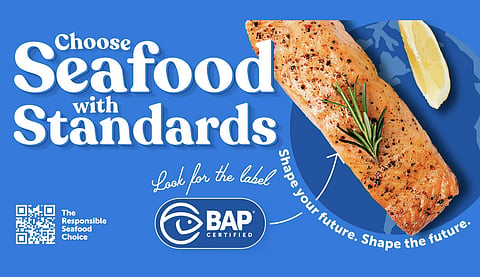

One of the point-of-sale material options for the GSA's campaign 'Choose Seafood with Standards'. Introduced last year, the 2023 Annual Report now captures its results.
Photo: Global Seafood Alliance (GSA).
The Global Seafood Alliance (GSA) has published its 2023 Annual Report that highlights key achievements, including the expansion of the Best Aquaculture Practices (BAP) and Best Seafood Practices (BSP) certification programs. At the close of the year, nearly 4,000 facilities were BAP-certified, a figure already surpassed at the time of reporting.
Mike Kocsis, who was appointed CEO of the Global Seafood Alliance in April 2024, has welcomed this data, which he says signifies the commitment not only of the organization in its mission to promote responsible seafood practices through advocacy, education, and demonstration but also of the industry as a whole.
"The BAP program is stronger and larger than ever – more than 4,000 facilities are now certified – and while I'd like to attribute that growth to our team's efforts, it's really an indicator that the seafood industry at large wants to improve, is willing to commit to responsible practices and seeks to lead by example," he stated.
As mentioned, the figure of 4,000 BAP-certified facilities had not yet been reached at the end of last year but was on the verge of being achieved. According to the GSA report, 2023 ended with a total of 3,959 certified processing plants, farms, hatcheries, and feed mills in 43 countries, and the BAP program grew by 18% over 2022.
Total number of producers with some form of GSA certification and volume across the production chain in 2023.
Graphic: Global Seafood Alliance (GSA).
However, as seen in the graphic and also highlighted by its CEO, GSA's work goes beyond aquaculture certification, and also continues its commitment to wild-caught seafood supply chains, which intensified three years ago with two key strategic alliances.
"FishChoice is helping us establish meaningful connections between fisheries engaged in Fishery Improvement Projects (FIPs), certified seafood processing facilities and the marketplace. Cutting-edge technologies, such as what Wholechain brings to the table, will enable efficiencies that will allow GSA to deliver supply chain assurances with more confidence and provide new levels of traceability," Mike Kocsis explained.
In the cover letter included in GSA's 2023 Annual Report, its CEO also emphasized that continuous improvement resides at the core of what it means to be a holder of Best Aquaculture Practices or Best Seafood Practices certification. "All of our standards, including the latest iteration of the Seafood Processing Standard – SPS 6.0, which will be fully implemented in 2025 – are strengthened over time," he said.
Likewise, in the release announcing its launch, the Global Seafood Alliance reported some new features in this year's report. Among others, it contains new data related to certification, including the percentage of global production volume that is certified, the volume of certified farms and plants by species, and the total number of non-conformities addressed by certified producers.
Specifically, the total number of nonconformities addressed by certified processing plants, farms, hatcheries, and feed mills in 2023 was 2,666 for food safety reasons, 2,623 for social responsibility issues, 2,037 for environmental points, 493 for animal welfare concerns, and 339 for traceability questions.
Finally, the report also highlights achievements related to advocacy and education initiatives, including membership - 50+ corporate members, 8k+ total membership program, 80% member renewal rate -; consumer marketing campaigns - the 'Choose Seafood with Standards' campaign was launched in September last year -; the Responsible Seafood Summit - held in New Brunswick in October 2023 -; The Advocate magazine; and the Aquademia podcast.
Headquartered in Portsmouth, N.H., USA, the Global Seafood Alliance is an international, non-profit trade association dedicated to advancing responsible seafood practices through education, advocacy, and third-party assurances.
Established in 1997 – originally as the Global Aquaculture Alliance -, the organization has become the leading provider of assurances for seafood globally through the development of its Best Aquaculture Practices and Best Seafood Practices certification programs. Its work addresses the full spectrum of responsibility, from environmental responsibility and social accountability to food safety.
